Enron's Fraud Scandal and the Sarbanes-Oxley Act 2002
VerifiedAdded on 2023/01/05
|12
|1916
|1
AI Summary
This report discusses Enron's fraud scandal, the largest bankruptcy reorganization in American history, and the rules and provisions of the Sarbanes-Oxley Act 2002. It explores the effectiveness of sections 302, 404, and 802 of the act in protecting shareholders and improving corporate oversight. The report concludes that the act plays a vital role in protecting investors and regaining trust in the economy.
Contribute Materials
Your contribution can guide someone’s learning journey. Share your
documents today.
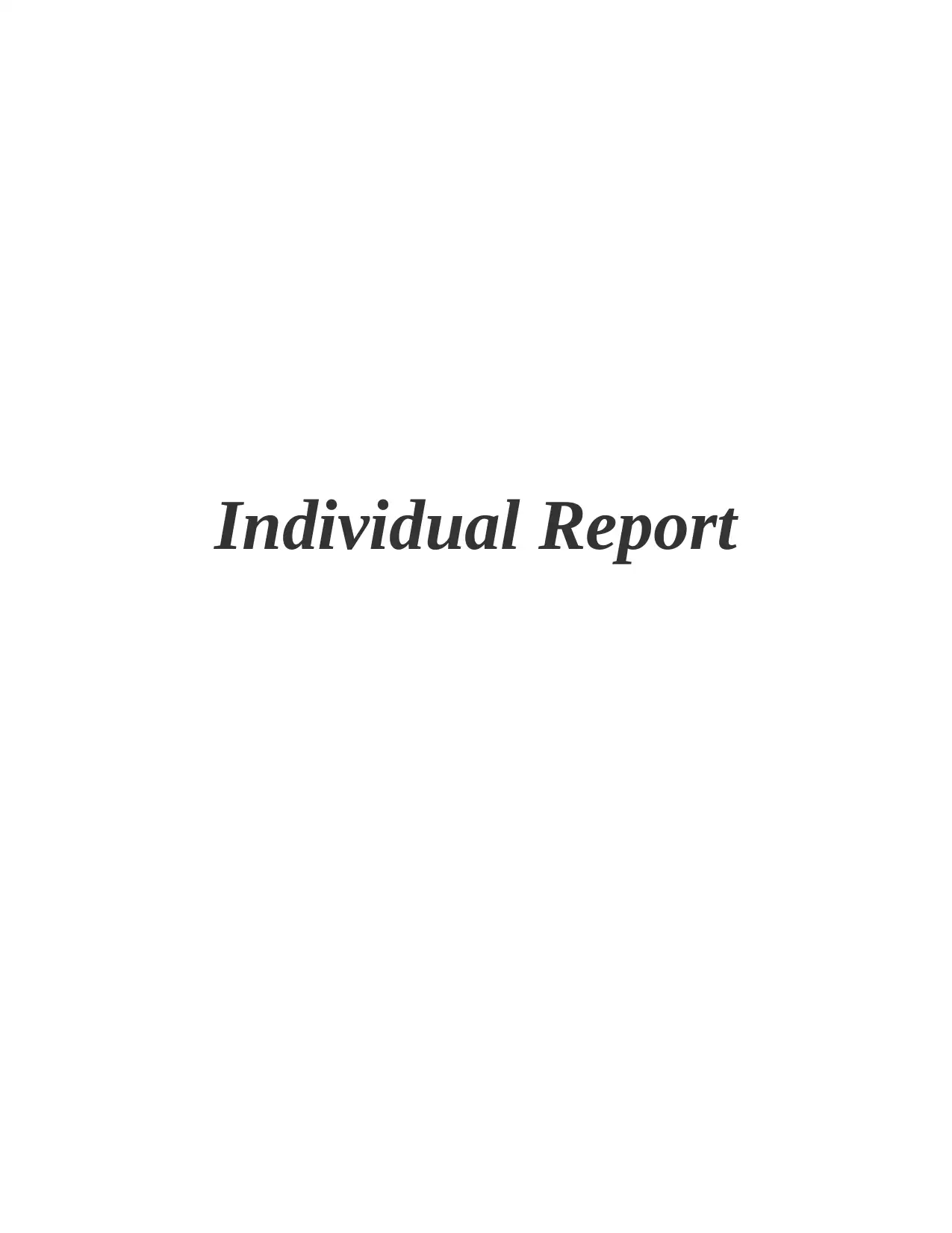
Individual Report
Secure Best Marks with AI Grader
Need help grading? Try our AI Grader for instant feedback on your assignments.
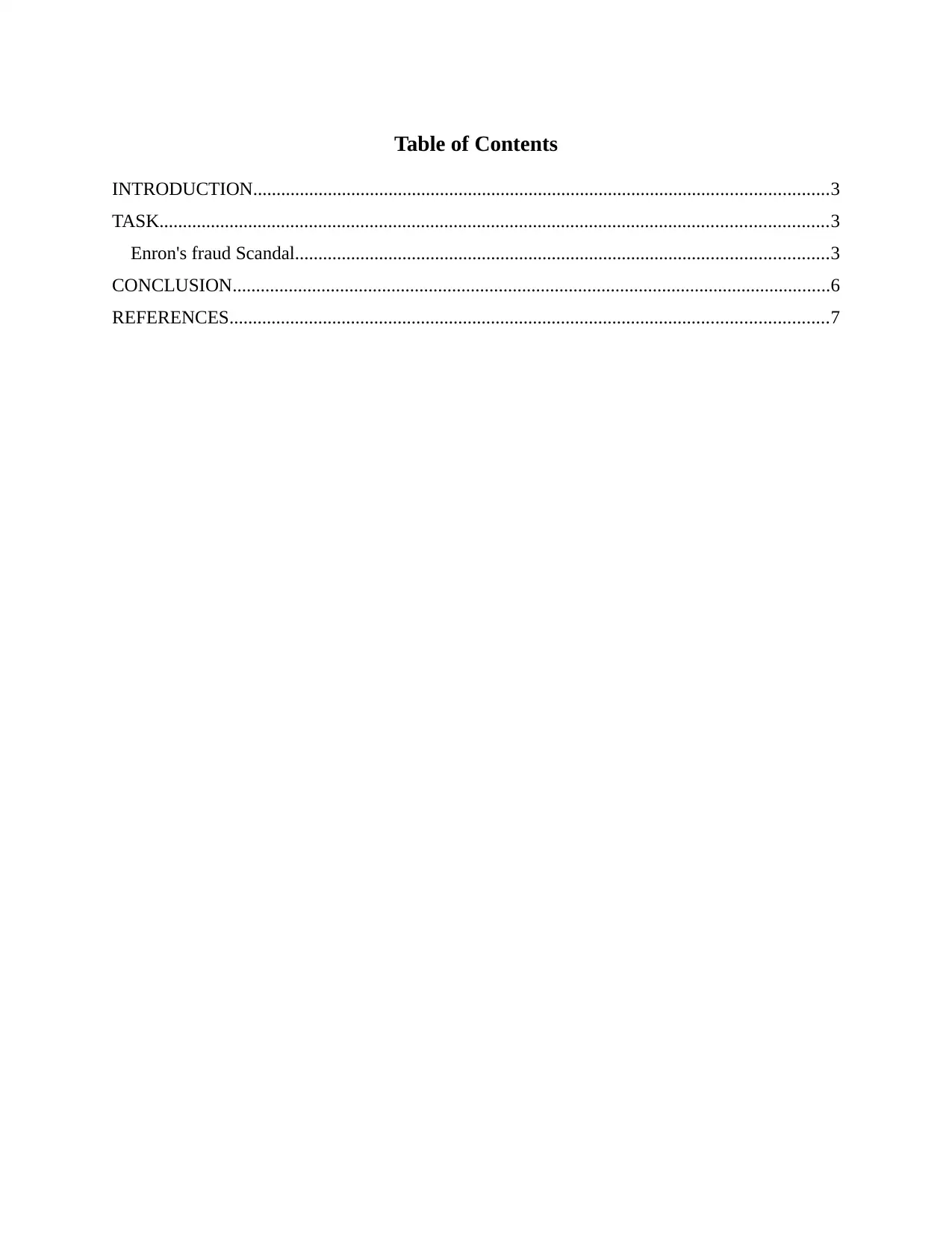
Table of Contents
INTRODUCTION...........................................................................................................................3
TASK...............................................................................................................................................3
Enron's fraud Scandal..................................................................................................................3
CONCLUSION................................................................................................................................6
REFERENCES................................................................................................................................7
INTRODUCTION...........................................................................................................................3
TASK...............................................................................................................................................3
Enron's fraud Scandal..................................................................................................................3
CONCLUSION................................................................................................................................6
REFERENCES................................................................................................................................7
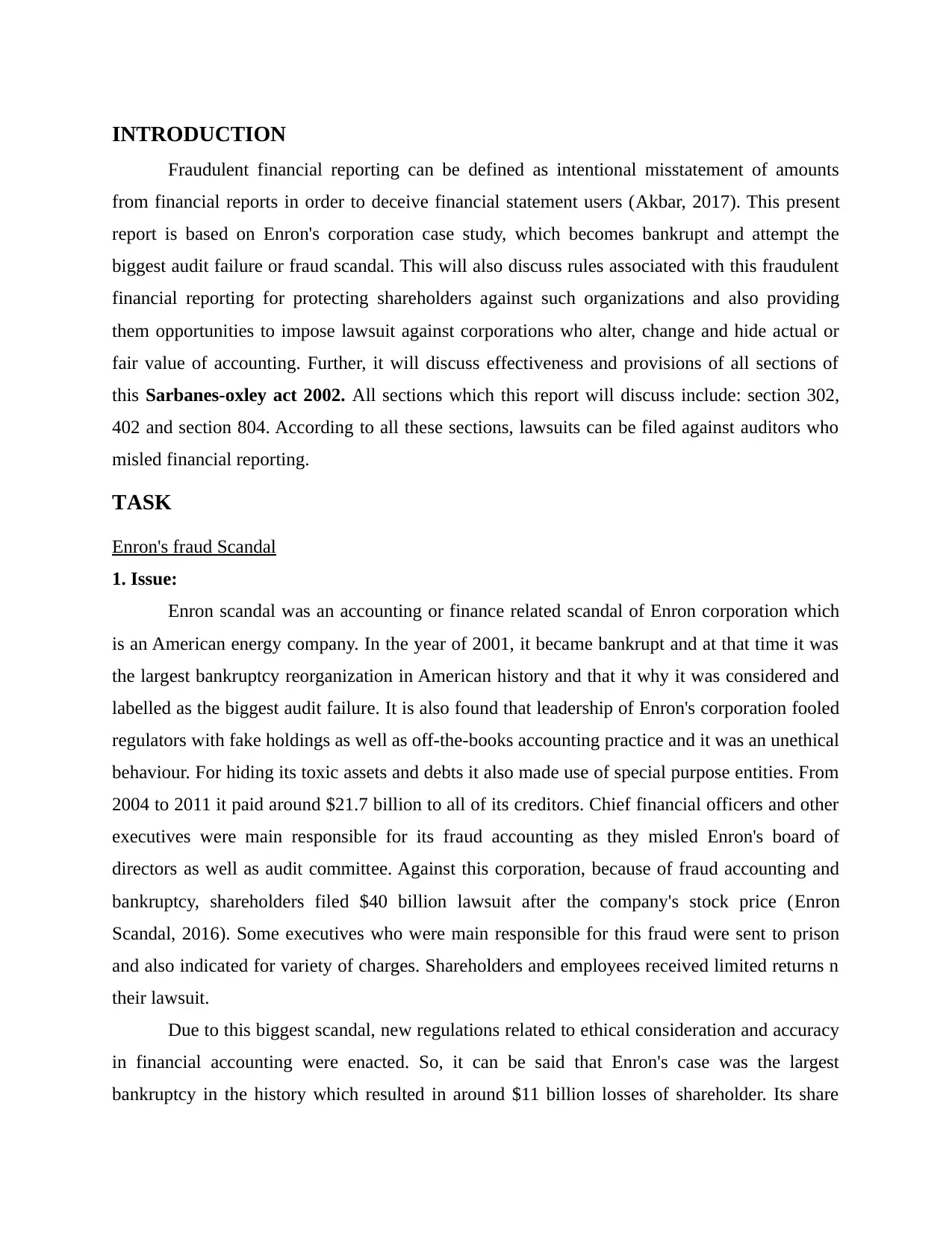
INTRODUCTION
Fraudulent financial reporting can be defined as intentional misstatement of amounts
from financial reports in order to deceive financial statement users (Akbar, 2017). This present
report is based on Enron's corporation case study, which becomes bankrupt and attempt the
biggest audit failure or fraud scandal. This will also discuss rules associated with this fraudulent
financial reporting for protecting shareholders against such organizations and also providing
them opportunities to impose lawsuit against corporations who alter, change and hide actual or
fair value of accounting. Further, it will discuss effectiveness and provisions of all sections of
this Sarbanes-oxley act 2002. All sections which this report will discuss include: section 302,
402 and section 804. According to all these sections, lawsuits can be filed against auditors who
misled financial reporting.
TASK
Enron's fraud Scandal
1. Issue:
Enron scandal was an accounting or finance related scandal of Enron corporation which
is an American energy company. In the year of 2001, it became bankrupt and at that time it was
the largest bankruptcy reorganization in American history and that it why it was considered and
labelled as the biggest audit failure. It is also found that leadership of Enron's corporation fooled
regulators with fake holdings as well as off-the-books accounting practice and it was an unethical
behaviour. For hiding its toxic assets and debts it also made use of special purpose entities. From
2004 to 2011 it paid around $21.7 billion to all of its creditors. Chief financial officers and other
executives were main responsible for its fraud accounting as they misled Enron's board of
directors as well as audit committee. Against this corporation, because of fraud accounting and
bankruptcy, shareholders filed $40 billion lawsuit after the company's stock price (Enron
Scandal, 2016). Some executives who were main responsible for this fraud were sent to prison
and also indicated for variety of charges. Shareholders and employees received limited returns n
their lawsuit.
Due to this biggest scandal, new regulations related to ethical consideration and accuracy
in financial accounting were enacted. So, it can be said that Enron's case was the largest
bankruptcy in the history which resulted in around $11 billion losses of shareholder. Its share
Fraudulent financial reporting can be defined as intentional misstatement of amounts
from financial reports in order to deceive financial statement users (Akbar, 2017). This present
report is based on Enron's corporation case study, which becomes bankrupt and attempt the
biggest audit failure or fraud scandal. This will also discuss rules associated with this fraudulent
financial reporting for protecting shareholders against such organizations and also providing
them opportunities to impose lawsuit against corporations who alter, change and hide actual or
fair value of accounting. Further, it will discuss effectiveness and provisions of all sections of
this Sarbanes-oxley act 2002. All sections which this report will discuss include: section 302,
402 and section 804. According to all these sections, lawsuits can be filed against auditors who
misled financial reporting.
TASK
Enron's fraud Scandal
1. Issue:
Enron scandal was an accounting or finance related scandal of Enron corporation which
is an American energy company. In the year of 2001, it became bankrupt and at that time it was
the largest bankruptcy reorganization in American history and that it why it was considered and
labelled as the biggest audit failure. It is also found that leadership of Enron's corporation fooled
regulators with fake holdings as well as off-the-books accounting practice and it was an unethical
behaviour. For hiding its toxic assets and debts it also made use of special purpose entities. From
2004 to 2011 it paid around $21.7 billion to all of its creditors. Chief financial officers and other
executives were main responsible for its fraud accounting as they misled Enron's board of
directors as well as audit committee. Against this corporation, because of fraud accounting and
bankruptcy, shareholders filed $40 billion lawsuit after the company's stock price (Enron
Scandal, 2016). Some executives who were main responsible for this fraud were sent to prison
and also indicated for variety of charges. Shareholders and employees received limited returns n
their lawsuit.
Due to this biggest scandal, new regulations related to ethical consideration and accuracy
in financial accounting were enacted. So, it can be said that Enron's case was the largest
bankruptcy in the history which resulted in around $11 billion losses of shareholder. Its share
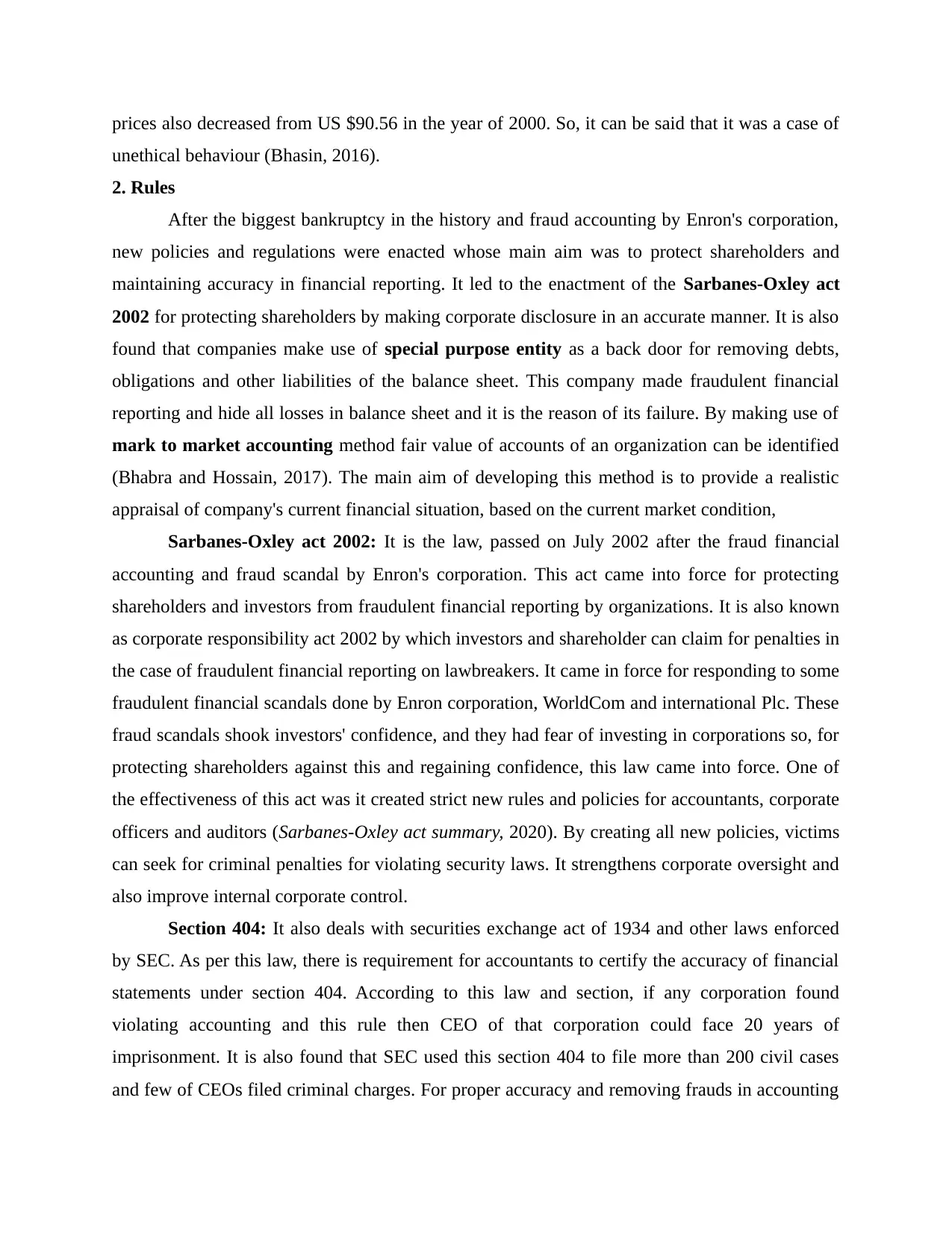
prices also decreased from US $90.56 in the year of 2000. So, it can be said that it was a case of
unethical behaviour (Bhasin, 2016).
2. Rules
After the biggest bankruptcy in the history and fraud accounting by Enron's corporation,
new policies and regulations were enacted whose main aim was to protect shareholders and
maintaining accuracy in financial reporting. It led to the enactment of the Sarbanes-Oxley act
2002 for protecting shareholders by making corporate disclosure in an accurate manner. It is also
found that companies make use of special purpose entity as a back door for removing debts,
obligations and other liabilities of the balance sheet. This company made fraudulent financial
reporting and hide all losses in balance sheet and it is the reason of its failure. By making use of
mark to market accounting method fair value of accounts of an organization can be identified
(Bhabra and Hossain, 2017). The main aim of developing this method is to provide a realistic
appraisal of company's current financial situation, based on the current market condition,
Sarbanes-Oxley act 2002: It is the law, passed on July 2002 after the fraud financial
accounting and fraud scandal by Enron's corporation. This act came into force for protecting
shareholders and investors from fraudulent financial reporting by organizations. It is also known
as corporate responsibility act 2002 by which investors and shareholder can claim for penalties in
the case of fraudulent financial reporting on lawbreakers. It came in force for responding to some
fraudulent financial scandals done by Enron corporation, WorldCom and international Plc. These
fraud scandals shook investors' confidence, and they had fear of investing in corporations so, for
protecting shareholders against this and regaining confidence, this law came into force. One of
the effectiveness of this act was it created strict new rules and policies for accountants, corporate
officers and auditors (Sarbanes-Oxley act summary, 2020). By creating all new policies, victims
can seek for criminal penalties for violating security laws. It strengthens corporate oversight and
also improve internal corporate control.
Section 404: It also deals with securities exchange act of 1934 and other laws enforced
by SEC. As per this law, there is requirement for accountants to certify the accuracy of financial
statements under section 404. According to this law and section, if any corporation found
violating accounting and this rule then CEO of that corporation could face 20 years of
imprisonment. It is also found that SEC used this section 404 to file more than 200 civil cases
and few of CEOs filed criminal charges. For proper accuracy and removing frauds in accounting
unethical behaviour (Bhasin, 2016).
2. Rules
After the biggest bankruptcy in the history and fraud accounting by Enron's corporation,
new policies and regulations were enacted whose main aim was to protect shareholders and
maintaining accuracy in financial reporting. It led to the enactment of the Sarbanes-Oxley act
2002 for protecting shareholders by making corporate disclosure in an accurate manner. It is also
found that companies make use of special purpose entity as a back door for removing debts,
obligations and other liabilities of the balance sheet. This company made fraudulent financial
reporting and hide all losses in balance sheet and it is the reason of its failure. By making use of
mark to market accounting method fair value of accounts of an organization can be identified
(Bhabra and Hossain, 2017). The main aim of developing this method is to provide a realistic
appraisal of company's current financial situation, based on the current market condition,
Sarbanes-Oxley act 2002: It is the law, passed on July 2002 after the fraud financial
accounting and fraud scandal by Enron's corporation. This act came into force for protecting
shareholders and investors from fraudulent financial reporting by organizations. It is also known
as corporate responsibility act 2002 by which investors and shareholder can claim for penalties in
the case of fraudulent financial reporting on lawbreakers. It came in force for responding to some
fraudulent financial scandals done by Enron corporation, WorldCom and international Plc. These
fraud scandals shook investors' confidence, and they had fear of investing in corporations so, for
protecting shareholders against this and regaining confidence, this law came into force. One of
the effectiveness of this act was it created strict new rules and policies for accountants, corporate
officers and auditors (Sarbanes-Oxley act summary, 2020). By creating all new policies, victims
can seek for criminal penalties for violating security laws. It strengthens corporate oversight and
also improve internal corporate control.
Section 404: It also deals with securities exchange act of 1934 and other laws enforced
by SEC. As per this law, there is requirement for accountants to certify the accuracy of financial
statements under section 404. According to this law and section, if any corporation found
violating accounting and this rule then CEO of that corporation could face 20 years of
imprisonment. It is also found that SEC used this section 404 to file more than 200 civil cases
and few of CEOs filed criminal charges. For proper accuracy and removing frauds in accounting
Secure Best Marks with AI Grader
Need help grading? Try our AI Grader for instant feedback on your assignments.
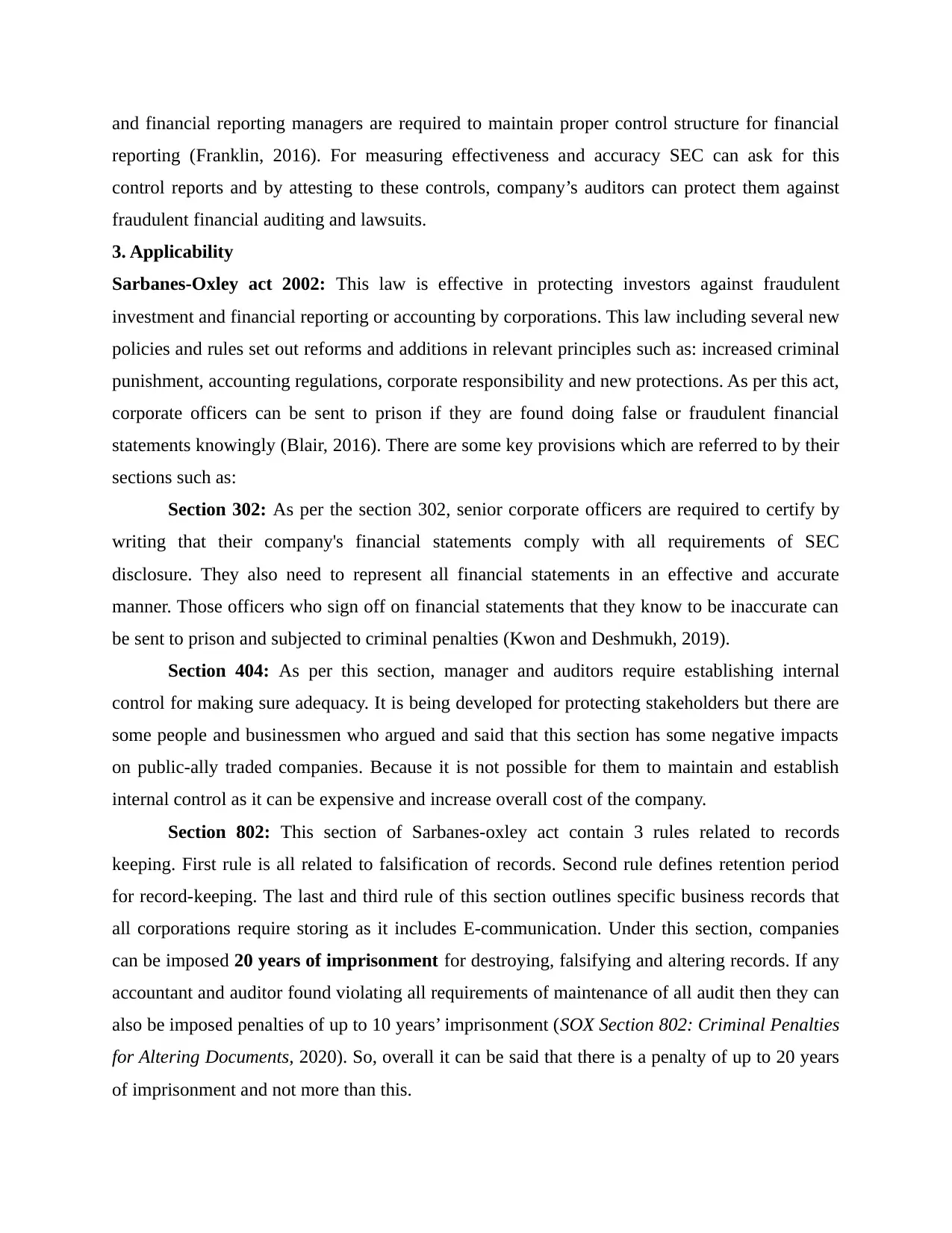
and financial reporting managers are required to maintain proper control structure for financial
reporting (Franklin, 2016). For measuring effectiveness and accuracy SEC can ask for this
control reports and by attesting to these controls, company’s auditors can protect them against
fraudulent financial auditing and lawsuits.
3. Applicability
Sarbanes-Oxley act 2002: This law is effective in protecting investors against fraudulent
investment and financial reporting or accounting by corporations. This law including several new
policies and rules set out reforms and additions in relevant principles such as: increased criminal
punishment, accounting regulations, corporate responsibility and new protections. As per this act,
corporate officers can be sent to prison if they are found doing false or fraudulent financial
statements knowingly (Blair, 2016). There are some key provisions which are referred to by their
sections such as:
Section 302: As per the section 302, senior corporate officers are required to certify by
writing that their company's financial statements comply with all requirements of SEC
disclosure. They also need to represent all financial statements in an effective and accurate
manner. Those officers who sign off on financial statements that they know to be inaccurate can
be sent to prison and subjected to criminal penalties (Kwon and Deshmukh, 2019).
Section 404: As per this section, manager and auditors require establishing internal
control for making sure adequacy. It is being developed for protecting stakeholders but there are
some people and businessmen who argued and said that this section has some negative impacts
on public-ally traded companies. Because it is not possible for them to maintain and establish
internal control as it can be expensive and increase overall cost of the company.
Section 802: This section of Sarbanes-oxley act contain 3 rules related to records
keeping. First rule is all related to falsification of records. Second rule defines retention period
for record-keeping. The last and third rule of this section outlines specific business records that
all corporations require storing as it includes E-communication. Under this section, companies
can be imposed 20 years of imprisonment for destroying, falsifying and altering records. If any
accountant and auditor found violating all requirements of maintenance of all audit then they can
also be imposed penalties of up to 10 years’ imprisonment (SOX Section 802: Criminal Penalties
for Altering Documents, 2020). So, overall it can be said that there is a penalty of up to 20 years
of imprisonment and not more than this.
reporting (Franklin, 2016). For measuring effectiveness and accuracy SEC can ask for this
control reports and by attesting to these controls, company’s auditors can protect them against
fraudulent financial auditing and lawsuits.
3. Applicability
Sarbanes-Oxley act 2002: This law is effective in protecting investors against fraudulent
investment and financial reporting or accounting by corporations. This law including several new
policies and rules set out reforms and additions in relevant principles such as: increased criminal
punishment, accounting regulations, corporate responsibility and new protections. As per this act,
corporate officers can be sent to prison if they are found doing false or fraudulent financial
statements knowingly (Blair, 2016). There are some key provisions which are referred to by their
sections such as:
Section 302: As per the section 302, senior corporate officers are required to certify by
writing that their company's financial statements comply with all requirements of SEC
disclosure. They also need to represent all financial statements in an effective and accurate
manner. Those officers who sign off on financial statements that they know to be inaccurate can
be sent to prison and subjected to criminal penalties (Kwon and Deshmukh, 2019).
Section 404: As per this section, manager and auditors require establishing internal
control for making sure adequacy. It is being developed for protecting stakeholders but there are
some people and businessmen who argued and said that this section has some negative impacts
on public-ally traded companies. Because it is not possible for them to maintain and establish
internal control as it can be expensive and increase overall cost of the company.
Section 802: This section of Sarbanes-oxley act contain 3 rules related to records
keeping. First rule is all related to falsification of records. Second rule defines retention period
for record-keeping. The last and third rule of this section outlines specific business records that
all corporations require storing as it includes E-communication. Under this section, companies
can be imposed 20 years of imprisonment for destroying, falsifying and altering records. If any
accountant and auditor found violating all requirements of maintenance of all audit then they can
also be imposed penalties of up to 10 years’ imprisonment (SOX Section 802: Criminal Penalties
for Altering Documents, 2020). So, overall it can be said that there is a penalty of up to 20 years
of imprisonment and not more than this.
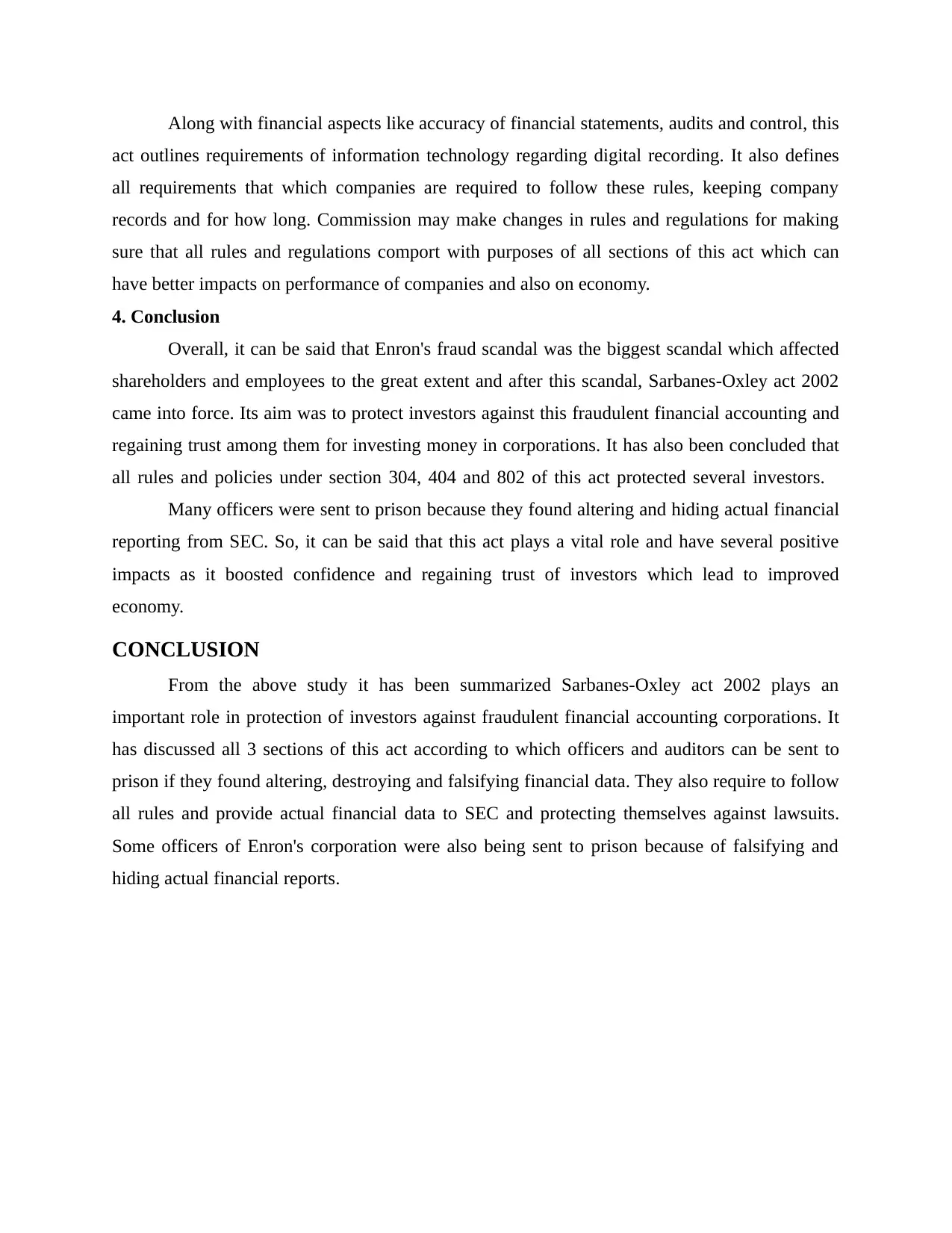
Along with financial aspects like accuracy of financial statements, audits and control, this
act outlines requirements of information technology regarding digital recording. It also defines
all requirements that which companies are required to follow these rules, keeping company
records and for how long. Commission may make changes in rules and regulations for making
sure that all rules and regulations comport with purposes of all sections of this act which can
have better impacts on performance of companies and also on economy.
4. Conclusion
Overall, it can be said that Enron's fraud scandal was the biggest scandal which affected
shareholders and employees to the great extent and after this scandal, Sarbanes-Oxley act 2002
came into force. Its aim was to protect investors against this fraudulent financial accounting and
regaining trust among them for investing money in corporations. It has also been concluded that
all rules and policies under section 304, 404 and 802 of this act protected several investors.
Many officers were sent to prison because they found altering and hiding actual financial
reporting from SEC. So, it can be said that this act plays a vital role and have several positive
impacts as it boosted confidence and regaining trust of investors which lead to improved
economy.
CONCLUSION
From the above study it has been summarized Sarbanes-Oxley act 2002 plays an
important role in protection of investors against fraudulent financial accounting corporations. It
has discussed all 3 sections of this act according to which officers and auditors can be sent to
prison if they found altering, destroying and falsifying financial data. They also require to follow
all rules and provide actual financial data to SEC and protecting themselves against lawsuits.
Some officers of Enron's corporation were also being sent to prison because of falsifying and
hiding actual financial reports.
act outlines requirements of information technology regarding digital recording. It also defines
all requirements that which companies are required to follow these rules, keeping company
records and for how long. Commission may make changes in rules and regulations for making
sure that all rules and regulations comport with purposes of all sections of this act which can
have better impacts on performance of companies and also on economy.
4. Conclusion
Overall, it can be said that Enron's fraud scandal was the biggest scandal which affected
shareholders and employees to the great extent and after this scandal, Sarbanes-Oxley act 2002
came into force. Its aim was to protect investors against this fraudulent financial accounting and
regaining trust among them for investing money in corporations. It has also been concluded that
all rules and policies under section 304, 404 and 802 of this act protected several investors.
Many officers were sent to prison because they found altering and hiding actual financial
reporting from SEC. So, it can be said that this act plays a vital role and have several positive
impacts as it boosted confidence and regaining trust of investors which lead to improved
economy.
CONCLUSION
From the above study it has been summarized Sarbanes-Oxley act 2002 plays an
important role in protection of investors against fraudulent financial accounting corporations. It
has discussed all 3 sections of this act according to which officers and auditors can be sent to
prison if they found altering, destroying and falsifying financial data. They also require to follow
all rules and provide actual financial data to SEC and protecting themselves against lawsuits.
Some officers of Enron's corporation were also being sent to prison because of falsifying and
hiding actual financial reports.
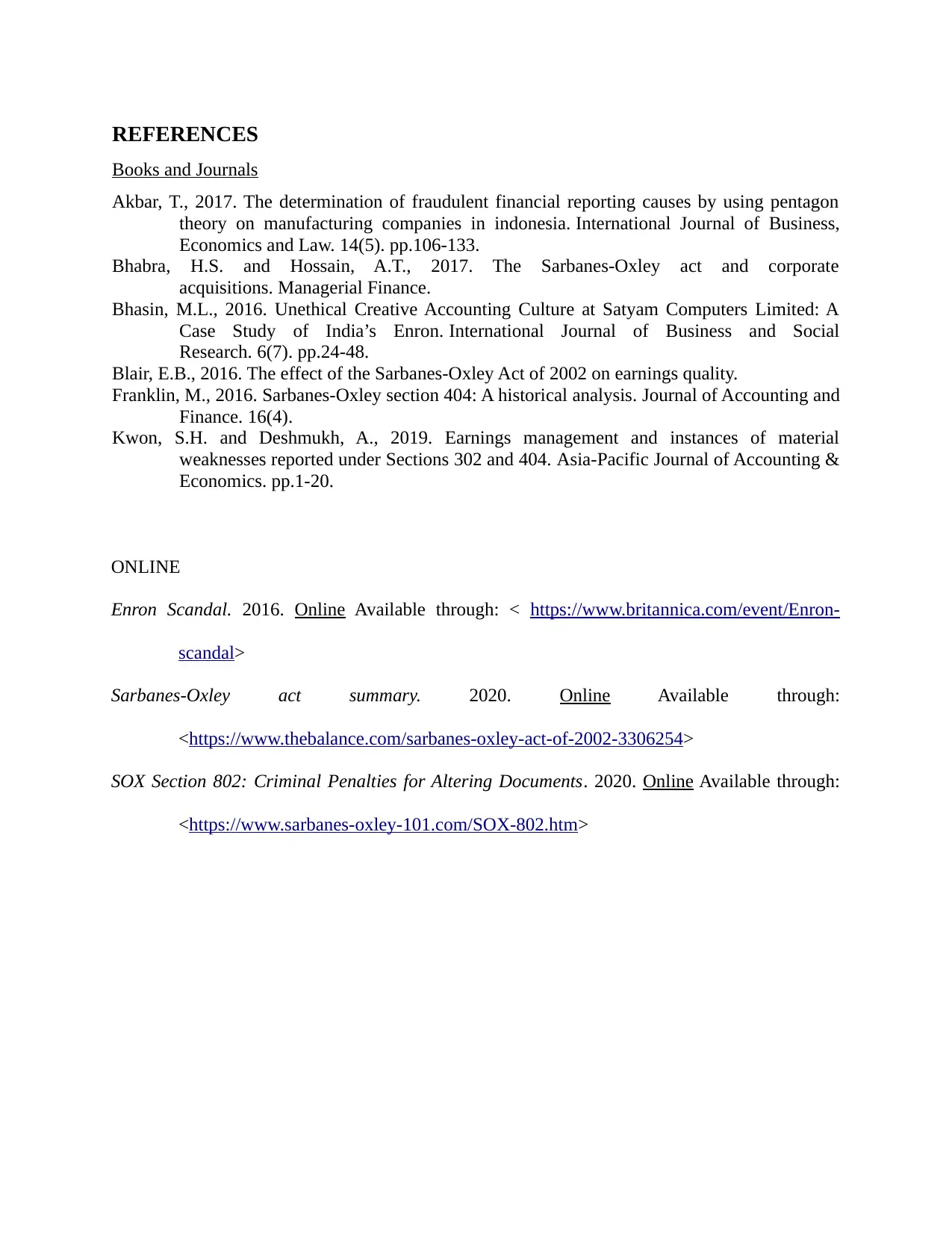
REFERENCES
Books and Journals
Akbar, T., 2017. The determination of fraudulent financial reporting causes by using pentagon
theory on manufacturing companies in indonesia. International Journal of Business,
Economics and Law. 14(5). pp.106-133.
Bhabra, H.S. and Hossain, A.T., 2017. The Sarbanes-Oxley act and corporate
acquisitions. Managerial Finance.
Bhasin, M.L., 2016. Unethical Creative Accounting Culture at Satyam Computers Limited: A
Case Study of India’s Enron. International Journal of Business and Social
Research. 6(7). pp.24-48.
Blair, E.B., 2016. The effect of the Sarbanes-Oxley Act of 2002 on earnings quality.
Franklin, M., 2016. Sarbanes-Oxley section 404: A historical analysis. Journal of Accounting and
Finance. 16(4).
Kwon, S.H. and Deshmukh, A., 2019. Earnings management and instances of material
weaknesses reported under Sections 302 and 404. Asia-Pacific Journal of Accounting &
Economics. pp.1-20.
ONLINE
Enron Scandal. 2016. Online Available through: < https://www.britannica.com/event/Enron-
scandal>
Sarbanes-Oxley act summary. 2020. Online Available through:
<https://www.thebalance.com/sarbanes-oxley-act-of-2002-3306254>
SOX Section 802: Criminal Penalties for Altering Documents. 2020. Online Available through:
<https://www.sarbanes-oxley-101.com/SOX-802.htm>
Books and Journals
Akbar, T., 2017. The determination of fraudulent financial reporting causes by using pentagon
theory on manufacturing companies in indonesia. International Journal of Business,
Economics and Law. 14(5). pp.106-133.
Bhabra, H.S. and Hossain, A.T., 2017. The Sarbanes-Oxley act and corporate
acquisitions. Managerial Finance.
Bhasin, M.L., 2016. Unethical Creative Accounting Culture at Satyam Computers Limited: A
Case Study of India’s Enron. International Journal of Business and Social
Research. 6(7). pp.24-48.
Blair, E.B., 2016. The effect of the Sarbanes-Oxley Act of 2002 on earnings quality.
Franklin, M., 2016. Sarbanes-Oxley section 404: A historical analysis. Journal of Accounting and
Finance. 16(4).
Kwon, S.H. and Deshmukh, A., 2019. Earnings management and instances of material
weaknesses reported under Sections 302 and 404. Asia-Pacific Journal of Accounting &
Economics. pp.1-20.
ONLINE
Enron Scandal. 2016. Online Available through: < https://www.britannica.com/event/Enron-
scandal>
Sarbanes-Oxley act summary. 2020. Online Available through:
<https://www.thebalance.com/sarbanes-oxley-act-of-2002-3306254>
SOX Section 802: Criminal Penalties for Altering Documents. 2020. Online Available through:
<https://www.sarbanes-oxley-101.com/SOX-802.htm>
Paraphrase This Document
Need a fresh take? Get an instant paraphrase of this document with our AI Paraphraser



Secure Best Marks with AI Grader
Need help grading? Try our AI Grader for instant feedback on your assignments.


1 out of 12
Related Documents
Your All-in-One AI-Powered Toolkit for Academic Success.
+13062052269
info@desklib.com
Available 24*7 on WhatsApp / Email
![[object Object]](/_next/static/media/star-bottom.7253800d.svg)
Unlock your academic potential
© 2024 | Zucol Services PVT LTD | All rights reserved.





